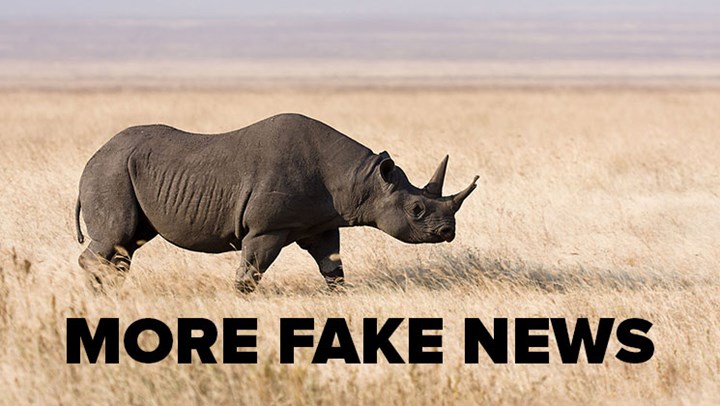
by Brian McCombie - Monday, June 11, 2018

Given the mainstream media’s obvious dislike of President Donald Trump, just about any Trump administration story is apparently fair game for misleading reporting—including news about hunting and conservation.
Case in point: a May 26, 2018, story posted online by “The Hill.”
The article tries to suggest that a Congressional reversal of Obama-era wildlife regulations on National Park Service (NPS) lands in Alaska was actually a move by the Trump Administration to allow for the killing of endangered species. Not true. In fact, that Congressional reversal reaffirmed the legal authority of Alaska and other states to manage their own wildlife. “The Hill’s” suggestion that this Congressional change will lead to the killing of endangered species, by hunters? Complete fiction.
The title itself, "Pro Hunting Trump Officials Take Ax to Wildlife Protections," immediately sets out the article's basic theme: Hunting is a huge threat to all wildlife, especially endangered species. It gets worse, right from the first paragraph:
"The Trump administration is systematically rolling back protections for endangered wildlife and expanding rights for hunters, winning cheers from sporting associations but worrying environmentalists who fear it will lead to the extinction of protected species."
The logic of the paragraph is that endangered species are being given less protection because hunters are getting more hunt opportunities. That's false all by itself. But the factual misinterpretations only increase in the following paragraph.
"The National Park Service announced last week it would end an Obama-era protection that prohibited the hunting of bear cubs, as well as wolves and pups in their dens, in Alaska's national preserves."
Many readers, especially those with no real knowledge of hunting or endangered species, will assume Alaska black bears and wolves are federally-protected species on the verge of extinction—with hunters leading the way toward that extinction.
In reality, wolves and black bears are not on Alaska's list of endangered or even threatened species. The only wolf even under consideration for listing is the Alexander Archipelago wolf, a subspecies of the gray or timber wolf found in southeast Alaska.
According to the Alaska Department of Fish and Game (ADFG) website, “Alaska is home to an estimated 7,000 to 11,000 wolves. Wolves have never been threatened or endangered in Alaska.” The same source notes that 100,000 black bears live within Alaska’s borders, a thriving and very healthy population.
“The Hill” article quotes people from the anti-hunting groups the Humane Society of the United States and the Center for Biological Diversity about the "assault on the animals and wildlife" these rules changes will cause.
Somehow, the reporter could only gather other, opposing viewpoints from press releases and speeches, and these references don't really deal with the issues at hand. At the very least, you'd think the reporter would've checked with ADFG officials to see what this "assault" might do to very robust populations of wolves and black bears.
In a week, "The Hill" generated nearly 22,000 shares across the Internet and social media, and was picked up by numerous other media—promoting yet another fake and harmful narrative about hunting and conservation.
The regulation changes mentioned (which were never truly examined in the article) concerned a Congressional change in wildlife management, signed into law by President Trump. Those changes affirmed that Alaska wildlife officials have the authority and right to manage their state’s wildlife. As the NRA Hunters Leadership Forum (HLF) reported on May 18, the Congressional Review Act gives Congress the power to examine and change federal regulations. In this case, it was a change to the Obama-era “Refuges Rule,” which restricted the use of predator control methods and prohibited certain hunting and trapping methods on National Wildlife Refuges in Alaska—methods that had been approved by ADFG.
Anti-hunting groups, including the Center for Biological Diversity, sued in federal court to challenge Congressional authority to review and reverse these regulations. And lost.
The NRA and its lobbying arm, the NRA Institute for Legislative Action (NRA-ILA), Safari Club International, the Pacific Legal Foundation and the State of Alaska intervened in the lawsuit to defend the congressional action.
“This decision reaffirms Alaska's right to manage its own fish and wildlife and Congress' right to repeal regulations and federal government overreach through the Congressional Review Act," said NRA-ILA Executive Director Chris W. Cox said at the time of the decision. "This is a huge win for hunters and state fish and game agencies."
And the argument which runs throughout The Hill article, that increasing opportunities for legal, conservation-based hunting means the extinction of endangered species? Utterly untrue.
If a National Wildlife Refuge opens more of its land to big game hunting, Endangered Species Act (ESA) protections are still very much in place. Information about said endangered species (if there are any) is made available to hunters and any other people who might be using these lands. Killing an endangered or threatened species on these or any other lands is a federal crime.
Actually, not one species has been listed as threatened or endangered because of the hunting laws put into place in the early 20th century—laws that are continually adjusted when scientific-based research requires adjustments. To the contrary, hunters have paid the wildlife restoration costs resulting in the recovery of many species of game and non-game, recovery to the point that these species could be delisted. Recent examples include bald eagles and the Rocky Mountain and Great Lakes’ wolf populations.
"The Hill" didn't point out these realities. It was too busy, it seems, taking a fake news-generated swipe at the Trump administration—and hunters in general.
E-mail your comments/questions about this site to:
[email protected]
